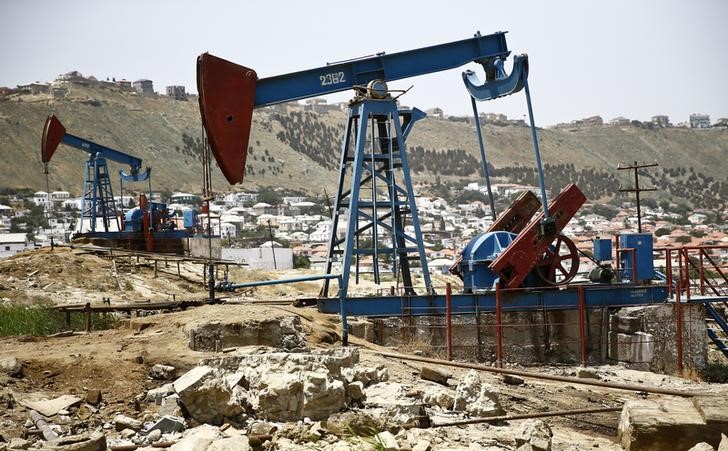By Jane Chung
SEOUL, June 2 (Reuters) - Oil prices dropped nearly 1 percent in early Asian trade on Friday, dragged down by ongoing concerns over a global glut in crude supply despite a bigger-than-expected draw in U.S. crude inventories.
Global benchmark Brent crude futures LCOc1 were down 39 cents, or 0.77 percent, at $50.25 a barrel at 0039 GMT.
U.S. West Texas Intermediate crude CLc1 futures dropped 45 cents, or 0.93 percent, to $47.91 per barrel.
Official data showed crude inventories in the United States, the world's top oil consumer, fell sharply last week as refining and exports surged to record highs. EIA/S
Crude stockpiles were down to 6.4 million barrels in the week to May 26, beating analyst expectations for a decrease of 2.5 million barrels.
Although a sharp fall of U.S. crude inventories could be seen as a supportive factor to oil prices, U.S. crude production rose to 9.35 million bpd last week, up nearly 500,000 bpd from a year ago.
Surging U.S. production has put a strain on OPEC members' efforts to curb production cuts in a bid to drain a global crude supply overhang and to prop up prices.
A week ago, the Organization of the Petroleum Exporting Countries (OPEC) and some non-OPEC members met in Vienna to roll over the output cut deal to reduce 1.8 million barrels per day (bpd) until the end of next March.
Faced with lingering glut woes, the oil cartel discussed last week reducing output by a further 1 to 1.5 percent, and could revisit the proposal should inventories remain high, according to sources. output from Nigeria and Libya is further undercutting the oil producers' attempt to limit oil production. Nigeria and Libya are exempted from curbing output as they seek to restore supplies hurt by internal conflicts.
Libya's oil production has risen to 827,000 bpd after technical problems were resolved at the Sharara field. That was above a three-year peak of 800,000 bpd reached earlier in May.
Some commodity markets were also absorbing news that President Donald Trump said he would withdraw the United States from the landmark 2015 global agreement to fight climate change, a move that fulfilled a major campaign pledge but drew condemnation from U.S. allies and business leaders. Jonathan Barratt, chief investment officer at Sydney's Ayers Alliance, said the U.S. decision to walk away from the climate agreement was not likely to impact oil markets.
"I see the little connection between oil markets and the Paris accord," Barratt said.
"I think the market is looking for swing factors like an increase in demand from China," he said.
